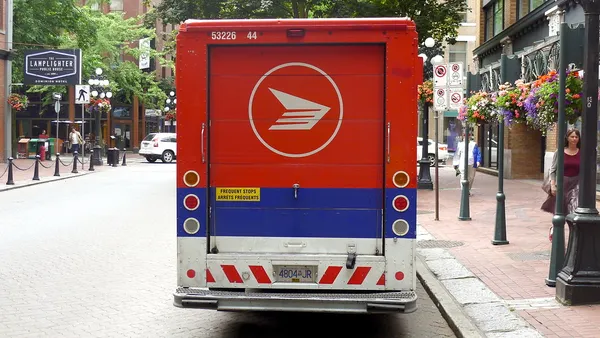Kroger believes its online operations have the potential to eventually yield margins that are at least as strong as what it sees with its traditional supermarket business, Chairman and CEO Rodney McMullen said Wednesday during the Bank of America Consumer & Retail Conference.
“If you look at our online business, the [in-store] business incrementally now is profitable. Barely. And if you look at the delivery, you know, that still has a lot of work to do. But I feel very confident that we'll get there and we'll figure it out,” McMullen said.
That conviction stems in large part from Kroger’s multibillion-dollar partnership with Ocado to develop a network of automated fulfillment facilities, McMullen said, adding that the high-profile project represents a long-term play designed to help transform the company over the next decade. Each of the customer fulfillment centers Kroger is building can handle the same volume as 10 to 12 supermarkets, he said.
“The biggest question is, is seamless going to be more important in ten years than today? And is it going to be meaningfully more important, where you invest a lot of resources, both talent capital and other things?” McMullen said. “And the answer to all those things are yes. And it's the ecosystem together that's so critical.”
McMullen also said Kroger is intent on offering consistent pricing to shoppers across all of its channels with the exception of its 30-minute delivery business, which it launched in 2021 in partnership with Instacart.
“If you look at the profitability, we price our product at what we think will be a sustainable model once you're at scale,” McMullen said. “We're not trying to price it such that we get everybody to use it, and then you start trying to raise prices afterwards, because we just don't think that that's a sustainable model.”
McMullen added that Kroger continues to find that loyal customers spend much more than people who don’t have a deep connection with the company, a phenomenon that he suggested makes investments in programs that enhance relationships with shoppers particularly worthwhile.
He noted, for example, that Kroger’s Boost online membership program is not profitable but more than earns its keep by incentivizing customers to come back.
“Boost is just one more thing to be able to give a customer a little bit better deal if they give you give loyalty back to you,” McMullen said. “You're not going to make money on Boost. But if you look at that customer’s ecosystem, when they engage with Boost, their volume goes up enough that it works for both.”
Another reason e-commerce has so much potential for the grocer is that its relatively new foray into retail media has a long runway for growth and has so far been substantially more profitable online than it has in the company’s stores, McMullen said.
“If you look at CPGs, they're spending $100 to $120 billion a year on media. Our share of that is just a fraction of what we think we should get or can get,” said McMullen. “We're just now learning the space and I'm more excited about it now than it was three or four years ago when we started … overall alternative profit last year was worth over $1.2 billion. And we would expect to continue to grow that.”
















